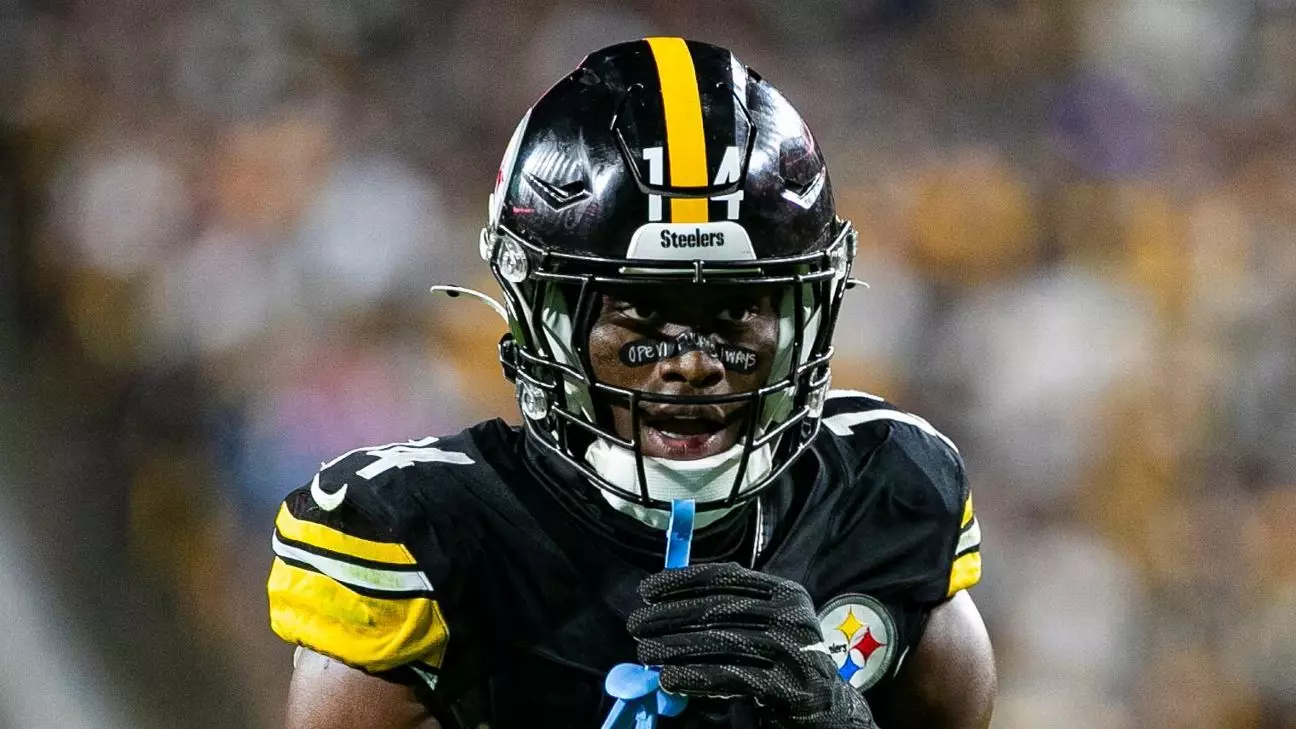In the high-stakes world of the NFL, the expectations placed on young players can be both a driving force and a source of friction. For Pittsburgh Steelers wide receiver George Pickens, recent events following a game against the Dallas Cowboys have turned him into a focal point, not just for his performance but for his conduct and expression on the field. Pickens’ experience emphasizes the struggle between personal expression, team dynamics, and the unforgiving glare of media scrutiny.
During the game, Pickens wore eye black that prominently featured the phrase “Open F—ing Always,” a bold statement that drew immediate attention. When asked about its meaning, Pickens downplayed its significance, referring to it simply as “just eye black.” Yet, this dismissive attitude raises questions about the balance between self-expression and professional decorum in a highly regulated league. The NFL’s uniform policy explicitly prohibits personal messages, which means Pickens faces potential disciplinary action. However, his apparent ignorance of this policy points to a possible disconnect between personal expression and league regulations, highlighting the need for clearer communication within organizations regarding expectations.
Controversially, Pickens seemed unfazed by the possibility of facing consequences. His nonchalant response when reminded of past fines, such as a similar incident involving teammate Cameron Heyward, suggests a disregard for history and precedent. Such an attitude could be interpreted in various ways: as youthful bravado, ignorance, or a deeper sense of entitlement that sometimes accompanies rising stars in any competitive arena. The question remains: in a league striving to maintain a certain image, where does the line between character and consequence lie?
The dynamics of team sports often require players to adjust their roles for the greater good of the squad. In the game against the Cowboys, Pickens played just 34 snaps, a career low. When questioned about this decision, he echoed the sentiments of head coach Mike Tomlin and offensive coordinator Arthur Smith, suggesting that it was merely part of the game plan. However, the strategic choice to limit his participation raised eyebrows, especially considering his talents and previous performances.
Despite Pickens’ assurances that the decisions were out of his hands, his visible frustration on the sidelines told a different story. He appeared despondent and agitated, which could indicate deeper tensions within the team regarding how talent is utilized. The coordination between Pickens, the coaching staff, and the quarterback remains critical. Smith’s comments reflect a broader philosophy about maximizing player usage, but it begs the question: how effective can a player be if their opportunities are skewed based on a game plan that may not fully leverage their skills?
Emotional management in sports has gained increased attention in recent years. Players like Pickens face immense pressure to perform at high levels while maintaining composure amidst adversity. Although Smith remarked that he did not sense frustration from Pickens regarding his snap count, the optics of a player slamming his helmet convey a narrative that might contradict that observation. The performance of players is not only influenced by the physical aspects of the game; mental fortitude plays a critical role.
The relationships among teammates, such as that between Pickens and quarterback Justin Fields, are pivotal in managing these pressures. Fields’ acknowledgment of their long-standing rapport is a crucial reminder that familiarity can foster understanding and support among players under duress. However, whether this bond extends into effective communication during tense moments remains to be seen, particularly when competitive instincts clash with team roles.
Lastly, Pickens’ competitive spirit brings both praise and scrutiny. His insistence on wanting more opportunities is emblematic of a drive that every successful athlete possesses. Yet, the line between being a passionate competitor and disrupting team cohesion can be razor-thin. Despite endorsements from his teammates, including quarterback Russell Wilson, the narrative surrounding Pickens could easily tip towards perceived selfishness if performance does not align with his expressed desires.
As Pickens continues to navigate his role, both within the Steelers organization and the wider NFL landscape, it stands as a reminder of the intricate balance between individual ambitions and collective goals. The pressure to perform at the highest level, alongside the weight of expectations—both self-imposed and external—can create a complex web for young players to weave through. Ultimately, Pickens’ journey is emblematic of the challenges faced by sports figures in balancing personal expression, professional growth, and the ever-watchful eye of fans and media alike.


Leave a Reply